中考英语语法--反意疑问句讲解 课件(共14张PPT,无音频)
文档属性
| 名称 | 中考英语语法--反意疑问句讲解 课件(共14张PPT,无音频) |
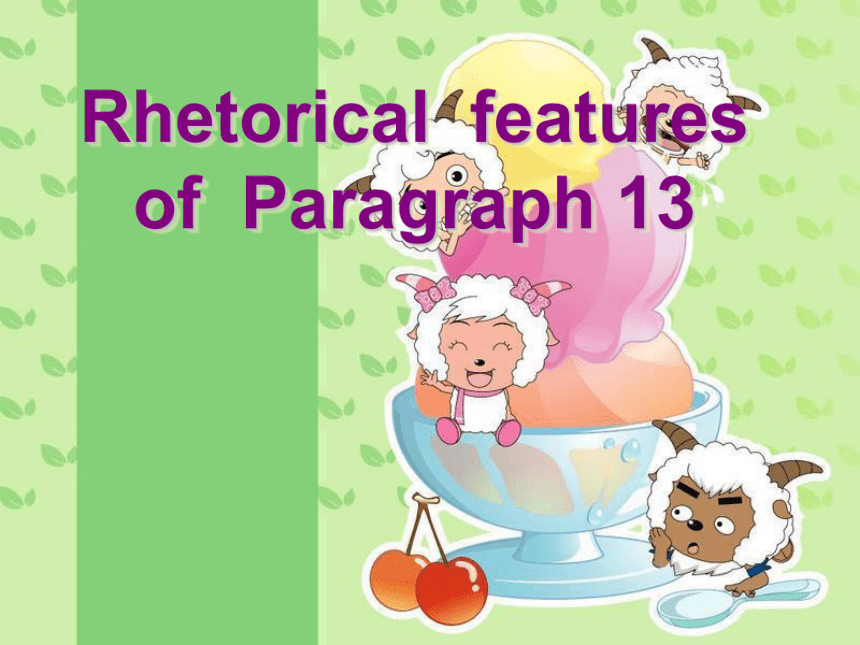
|
|
| 格式 | zip | ||
| 文件大小 | 1.9MB | ||
| 资源类型 | 教案 | ||
| 版本资源 | 通用版 | ||
| 科目 | 英语 | ||
| 更新时间 | 2020-07-01 00:00:00 | ||
图片预览

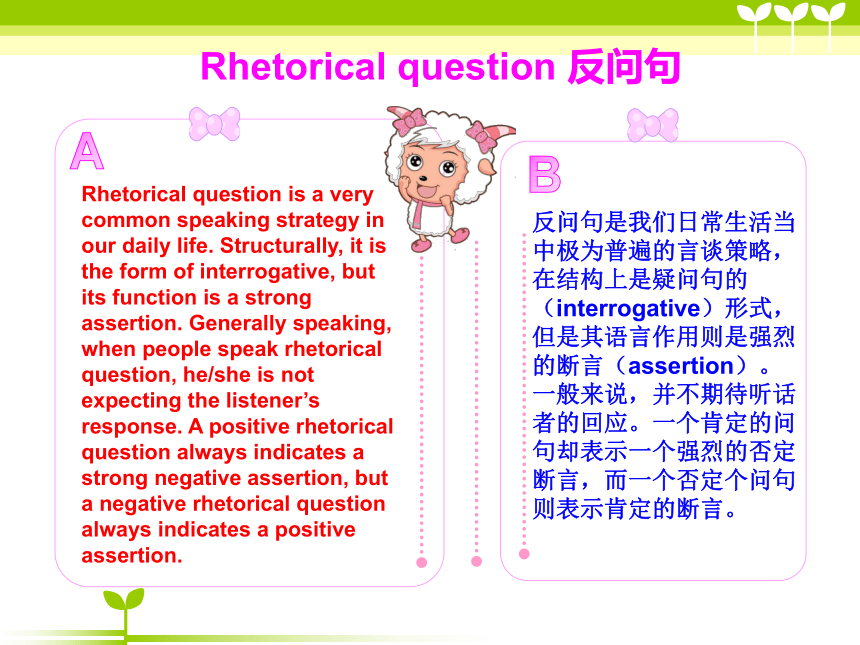

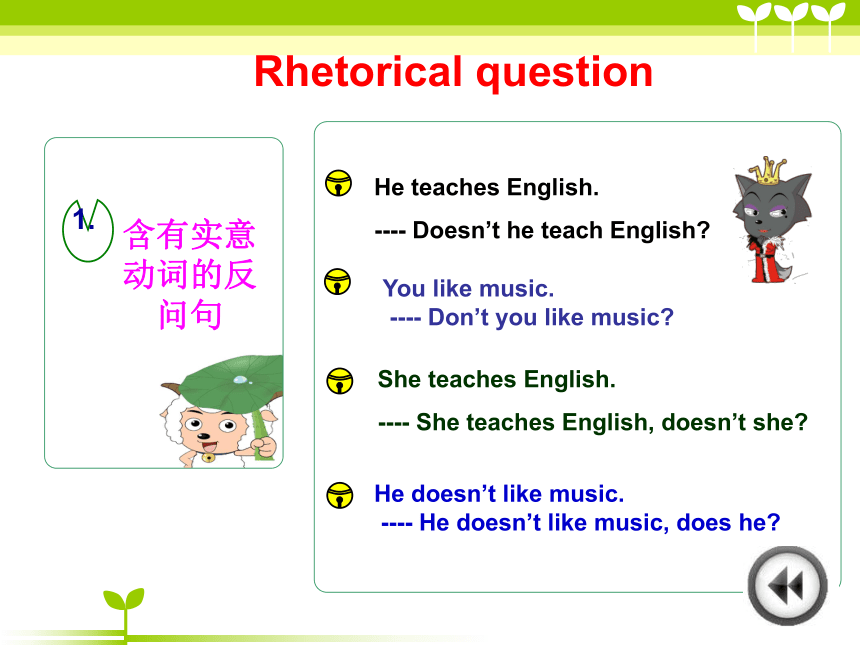
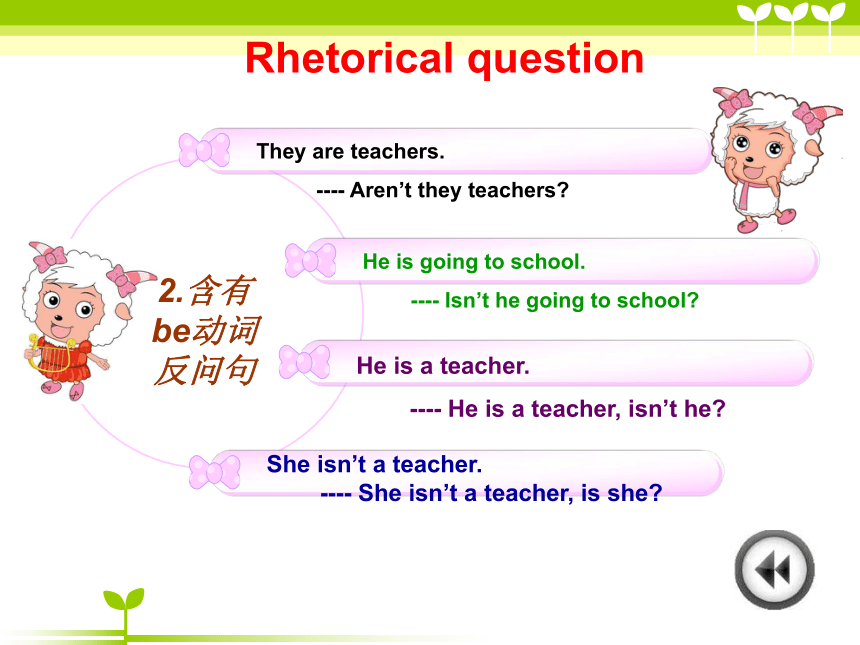
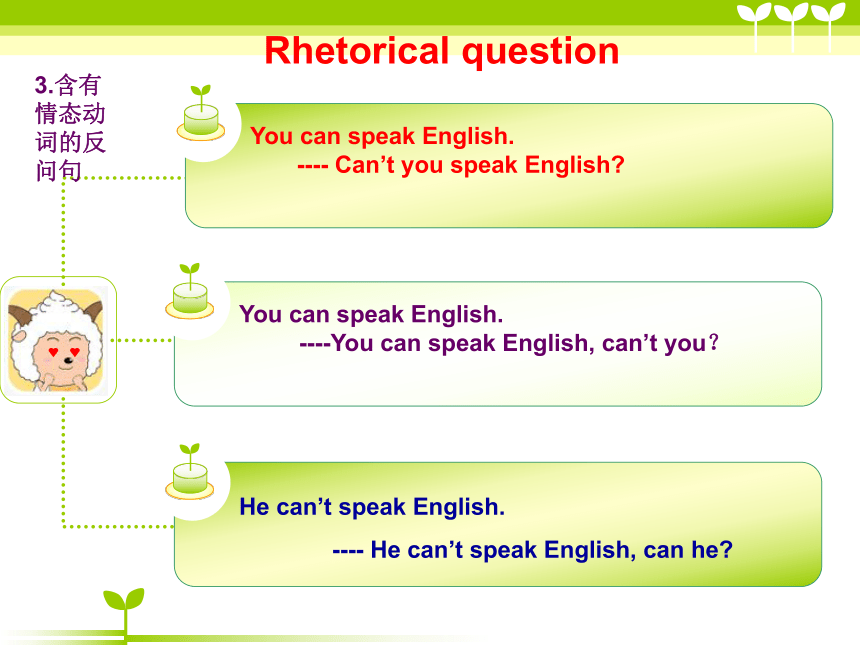
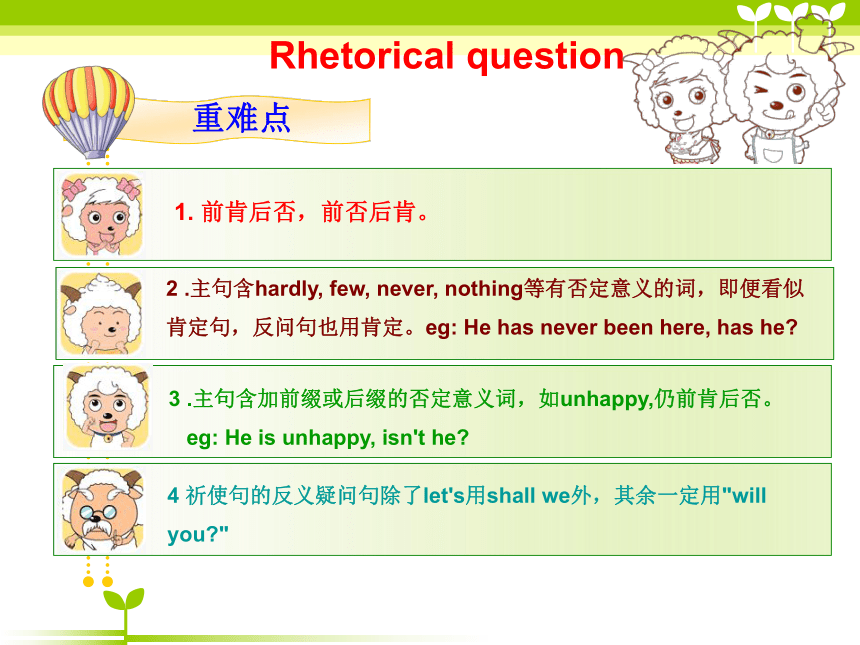
文档简介
(共14张PPT)
Rhetorical
features
of
Paragraph
13
Rhetorical
question
反问句
Rhetorical
question
is
a
very
common
speaking
strategy
in
our
daily
life.
Structurally,
it
is
the
form
of
interrogative,
but
its
fun_ction
is
a
strong
assertion.
Generally
speaking,
when
people
speak
rhetorical
question,
he/she
is
not
expecting
the
listener’s
response.
A
positive
rhetorical
question
always
indicates
a
strong
negative
assertion,
but
a
negative
rhetorical
question
always
indicates
a
positive
assertion.
反问句是我们日常生活当中极为普遍的言谈策略,在结构上是疑问句的(interrogative)形式,但是其语言作用则是强烈的断言(assertion)。一般来说,并不期待听话者的回应。一个肯定的问句却表示一个强烈的否定断言,而一个否定个问句则表示肯定的断言。
反问句句式举例
含有实意动词的反问句
含有be动词反问句
含有情态动词的反问句
Rhetorical
question
1.
含有实意动词的反问句
He
teaches
English.
----
Doesn’t
he
teach
English?
You
like
music.
----
Don’t
you
like
music?
She
teaches
English.
----
She
teaches
English,
doesn’t
she?
He
doesn’t
like
music.
----
He
doesn’t
like
music,
does
he?
Rhetorical
question
2.含有be动词反问句
Rhetorical
question
3.含有情态动词的反问句
Rhetorical
question
1.
前肯后否,前否后肯。
2
.主句含hardly,
few,
never,
nothing等有否定意义的词,即便看似肯定句,反问句也用肯定。eg:
He
has
never
been
here,
has
he?
3
.主句含加前缀或后缀的否定意义词,如unhappy,仍前肯后否。
eg:
He
is
unhappy,
isn't
he?
4
祈使句的反义疑问句除了let's用shall
we外,其余一定用"will
you?"
重难点
Rhetorical
question
重难点
Rhetorical
question
8
.当主句谓语动词为行为动词,而前面又没有助动词时,疑问部分用do,
does或did引导。
注意:have
has
当have,
has是在构成完成时态时,疑问部分用其引导,但当其是实意动词时,用do,
does引导(当have,
has表示拥有时也可自己引导,但现在不常用)
9
.感叹句的反意疑问句要用be的现在时,对人的感叹用人称代词,对物的感叹用it,且疑问部分必定是否定形式。
重难点
Rhetorical
question
关于think的反问句
forms(两种形式)
一种是在从句部分构成反问
eg:我认为这个答案是对的,对不?
I
think
this
answer
is
right,
isn't
it?
一种是在主句,即就think构成反问,主要是看问者的旨意是什么
你认为你没犯错误,不是这样想的吗?’
eg:You
thought
you
hadn't
made
any
mistakes,
didn't
you?
Rhetorical
question
对于反问句的回答
Rhetorical
question
Rhetorical
question
若它的主句是肯定句,yes和no还是本来的意思
若在后面加了逗号再加什么she
did之类的,意思就反了
若它的主句是否定句:如果只用Yes和No,还是本来的意思
对于反问句的回答
Thank
you!
Rhetorical
features
of
Paragraph
13
Rhetorical
question
反问句
Rhetorical
question
is
a
very
common
speaking
strategy
in
our
daily
life.
Structurally,
it
is
the
form
of
interrogative,
but
its
fun_ction
is
a
strong
assertion.
Generally
speaking,
when
people
speak
rhetorical
question,
he/she
is
not
expecting
the
listener’s
response.
A
positive
rhetorical
question
always
indicates
a
strong
negative
assertion,
but
a
negative
rhetorical
question
always
indicates
a
positive
assertion.
反问句是我们日常生活当中极为普遍的言谈策略,在结构上是疑问句的(interrogative)形式,但是其语言作用则是强烈的断言(assertion)。一般来说,并不期待听话者的回应。一个肯定的问句却表示一个强烈的否定断言,而一个否定个问句则表示肯定的断言。
反问句句式举例
含有实意动词的反问句
含有be动词反问句
含有情态动词的反问句
Rhetorical
question
1.
含有实意动词的反问句
He
teaches
English.
----
Doesn’t
he
teach
English?
You
like
music.
----
Don’t
you
like
music?
She
teaches
English.
----
She
teaches
English,
doesn’t
she?
He
doesn’t
like
music.
----
He
doesn’t
like
music,
does
he?
Rhetorical
question
2.含有be动词反问句
Rhetorical
question
3.含有情态动词的反问句
Rhetorical
question
1.
前肯后否,前否后肯。
2
.主句含hardly,
few,
never,
nothing等有否定意义的词,即便看似肯定句,反问句也用肯定。eg:
He
has
never
been
here,
has
he?
3
.主句含加前缀或后缀的否定意义词,如unhappy,仍前肯后否。
eg:
He
is
unhappy,
isn't
he?
4
祈使句的反义疑问句除了let's用shall
we外,其余一定用"will
you?"
重难点
Rhetorical
question
重难点
Rhetorical
question
8
.当主句谓语动词为行为动词,而前面又没有助动词时,疑问部分用do,
does或did引导。
注意:have
has
当have,
has是在构成完成时态时,疑问部分用其引导,但当其是实意动词时,用do,
does引导(当have,
has表示拥有时也可自己引导,但现在不常用)
9
.感叹句的反意疑问句要用be的现在时,对人的感叹用人称代词,对物的感叹用it,且疑问部分必定是否定形式。
重难点
Rhetorical
question
关于think的反问句
forms(两种形式)
一种是在从句部分构成反问
eg:我认为这个答案是对的,对不?
I
think
this
answer
is
right,
isn't
it?
一种是在主句,即就think构成反问,主要是看问者的旨意是什么
你认为你没犯错误,不是这样想的吗?’
eg:You
thought
you
hadn't
made
any
mistakes,
didn't
you?
Rhetorical
question
对于反问句的回答
Rhetorical
question
Rhetorical
question
若它的主句是肯定句,yes和no还是本来的意思
若在后面加了逗号再加什么she
did之类的,意思就反了
若它的主句是否定句:如果只用Yes和No,还是本来的意思
对于反问句的回答
Thank
you!
同课章节目录
- 词法
- 名词
- 动词和动词短语
- 动词语态
- 动词时态
- 助动词和情态动词
- 非谓语动词
- 冠词
- 代词
- 数词和量词
- 形容词副词及其比较等级
- 介词和介词短语
- 连词和感叹词
- 构词法
- 相似、相近词比较
- 句法
- 陈述句
- 一般疑问句和否定疑问句
- 特殊疑问句及选择疑问句
- 反意疑问句
- 存在句(There be句型)
- 宾语从句
- 定语从句
- 状语从句
- 主谓一致问题
- 简单句
- 并列句
- 复合句
- 主谓一致
- 主、表语从句
- 名词性从句
- 直接引语和间接引语
- 虚拟语气
- 感叹句
- 强调句
- 倒装句
- 祈使句
- 句子的成分
- 句子的分类
- 题型专区
- 单项选择部分
- 易错题
- 完形填空
- 阅读理解
- 词汇练习
- 听说训练
- 句型转换
- 补全对话
- 短文改错
- 翻译
- 书面表达
- 任务型阅读
- 语法填空
- 其他资料
